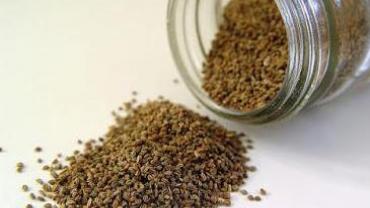
Raw celery lends a crunch to crudité platters and filling the stalks with peanut butter or cream cheese and raisins—“ants on a log”—is a surefire way to get kids to eat a vegetable they’d normally turn their nose up at. Combined with onions and carrots to create the classic culinary mirepoix celery makes frequent appearance as the basis for savory dishes especially in soups and stews. But celery’s usefulness isn’t limited to what it can do in the kitchen or in school lunchboxes. The tiny black seeds that grow into wild celery have impressive properties of their own.
Celery seeds contain 15% fatty oil with the largest component being petroselinic acid (64.3%) a monounsaturated fat also found in coriander and parsley seed. The remainder contains linoleic (18%) oleic (8.1%) linolenic (0.6%) and palmitic acids. Celery seed is also composed of 2% volatile oil which is employed as an ingredient in perfumes and food flavorings.
Celery seeds have been used in Traditional Chinese Medicine for a number of health concerns particularly ones relating to cardiovascular function. Modern research techniques are now validating these beneficial effects. Studies in hypertensive rats support a role for celery seed extract in lowering blood pressure. One of the chemical constituents of celery seed oil n-Butylphthalide (NBP) is a primary contributor to the flavor and aroma of celery and it is this compound that is believed to be responsible for the antihypertensive effects. The reduced blood pressure may be due to diuretic and vasodilatory properties of celery seed. It is important to note that the reduced blood pressure was accompanied by a significant increase in the rats’ heart rate which the researchers speculated was likely a way to compensate for the reduced blood pressure. The beneficial effects of any compound that may affect physiological function should always be weighed against other potential outcomes.
The same compound NBP has been shown to reduce kidney damage resulting from hypertension in rats decreasing urinary albumin excretion and blood urea nitrogen levels. NBP at 15 or 30mg/kg daily for 20 weeks significantly decreased blood pressure and the rate of glomerulosclerosis. It also protected against impairment of renal tubule function decreased oxidative stress and reduced expression of pro-inflammatory cytokines in kidney tissue.
Celery seed extract (CSE) may also have beneficial effects for cardiovascular health. Cultured mouse macrophages pre-incubated with CSE experienced significantly less damage upon exposure to oxidized LDL particles. CSE decreased the secretion of inflammatory markers TNF-α and IL-6 by 12-27% and 5-15% respectively. CSE was also shown to inhibit the apoptosis of macrophages that otherwise might have been induced by the oxidized lipoproteins. Pre-incubation of cells with CSE at 100 and 200 g/ml promoted cell viability by 28% and 40% respectively. The apoptosis of macrophage foam cells in areas where phagocytic clearance is impaired is a contributing factor in the enlargement of atherosclerotic plaque.
Other conditions for which CSE has shown promise include stroke vascular dementia and Alzheimer’s disease. Rats given 20mg/kg of NBP isolated from celery seed exhibited protection from ischemia-induced injury to the hippocampus. They had reduced deficits in spatial learning and performed better in a maze task. NBP may also protect against some of the neuronal damage induced by the amyloid-beta (Aβ) peptides associated with Alzheimer’s. Daily treatments of 10 and 30 mg/kg of this celery seed compound attenuated working memory deficits and inhibited neuronal apoptosis in rats that had received intracerebroventricular infusion of Aβ. Hyperphosphorylated tau proteins are another hallmark of Alzheimer’s disease. NBP was shown to reduce activation of glycogen synthase kinase-3β the enzyme responsible for tau protein phosphorylation.
Finally celery seed extract may have a role as a natural anti-inflammatory and analgesic. It has shown efficacy in reducing platelet aggregation and inhibits inflammatory prostaglandin-producing enzymes COX-I and COX-II.
To date much of the research on celery seed extract and NBP have employed relatively high doses of these compounds. Studies in rats indicate that even at doses of 5000mg/kg per day there were no adverse effects.